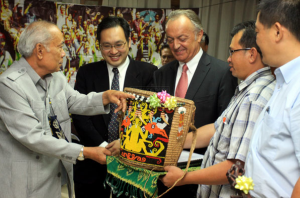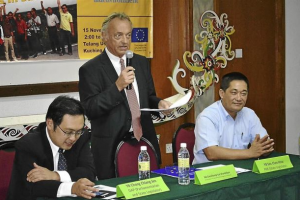
A forum on land, justice and human rights on the situation of the indigenous peoples in Sarawak was held in Kuching yesterday. The forum was attended by ambassador and head of the European Union delegation to Malaysia, Luc Vandebon.
Also present were Bandar Kuching MP and also Kota Sentosa assemblyman Chong Chieng Jen, Batu Lintang assemblyman See Chee How and Sarawak Dayak Iban Association (SADIA) president Sidi Munan. It was also attended by about 100 natives, mostly the NCR land owners.
Grouses pertaining to land encroachment were raised by the participants, particularly on the issuance of provisional lease (PL) by the government. There was also a 14-minute slide show about the people in Melikin who defended their land rights.
Both Chong and See said they will continue to raise NCR land issues in the state legislative assembly (DUN) sittings and bring the cases to court to protect and fight for the ultimate rights of NCR landowners in the state. They also said there were over 400 courts cases still ongoing, adding that NCR landowners have won many cases.
Vandebon said he had earlier attended a meeting with the state government, stating “It is good to hear both sides of the story,”
In a statement distributed to the media, it stated that the number of disputes between the communities and the logging and palm oil companies continued to increase. Consequently, various cases of alleged human rights violations purportedly committed by the police and private companies against local leaders and anti-land grabbing activists were being reported, it stressed. The statement added that amid the situation, achieving justice and upholding the human rights of the indigenous people remain a big challenge.
“As indigenous people, the Dayaks are supposedly protected under the Constitution of Malaysia and the rights, particularly recognised as NCR in Sarawak. More so, Malaysia is a signatory to the United Nations Declaration on the Rights of Indigenous People (UNDRIP),” the statement said.
The European Union (EU) is still hoping to get Sarawak on board the Voluntary Partnership Agreement (VPA) that would better identify timber sources in order to help reduce illegal trade.
Called the Forest Law Enforcement, Governance and Trade (FLEGT) VPA, the agreement is in the last negotiation stages in Peninsular Malaysia.
Once finalised, it will not include Sarawak, which means timber from the state will not be legally allowed into the markets of EU’s 28 member countries.
“We really hope Sarawak would join (the VPA) at a later stage,” said ambassador and head of the EU delegation to Malaysia, Luc Vandebon, who was speaking at a forum on “Land, Justice and Human Rights: The Situation of the Indigenous Peoples in Sarawak” here yesterday.
“It is in discussion. Maybe next year (the talks will be extended to Sarawak).”

The forum was jointly organised by Sarawak Dayak Iban Association (Sadia), Pesticide Action Network Asia and the Pacific (PAN AP), with the participation of Aidenvironment from Indonesia.
Sarawak PKR vice-chairman See Chee How, an invited speaker at the forum, alleged both state government and the private sector were uninterested in the VPA because of high demand from Japan, China, Hong Kong, Taiwan and Singapore — all of which are outside the EU.
“Given all these demands elsewhere for our timber, it’s no wonder that Sarawak opted out,” said See, who is Batu Lintang assemblyman.
State DAP chairman Chong Chieng Jen, who is Bandar Kuching MP and Kota Sentosa assemblyman, concurred with See saying that external demands for timber and palm oil were partly to be blamed for the infringement of native rights in Sarawak.
“When the buying stops, the felling (of trees) and grabbing (of land) stops. It’s as simple as that,” he told the forum.
For more information see:
http://www.theborneopost.com/2013/11/16/eu-envoy-to-msia-attends-forum-on-ncr-land/
